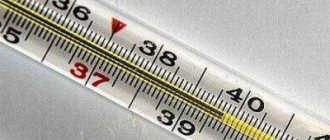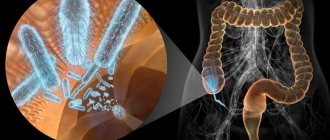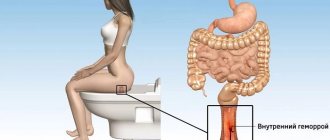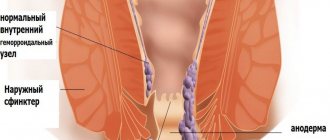Rectal diseases can occur suddenly. There is discomfort and itching in the anal canal. Can hemorrhoids be treated and how long does it take for complete healing?
Hemorrhoidal disease is characterized by many different symptoms. The patient experiences pain and is tormented by burning and itching in the anus. Less common are mucous discharge, rectal bleeding, and hemorrhoids begin to fall out.
The medical classification of hemorrhoids is extensive. According to the nature of the disease, it can be chronic or acute. Based on its form, the disease is divided into internal, external and combined.
| Features of the disease | |
| Main causes | alcohol abuse, sedentary lifestyle, pregnancy, heavy physical activity, chronic pathologies of veins and blood vessels. |
| What threatens | an advanced form can lead to severe posthemorrhagic anemia and rectal cancer. |
| Best surgical treatment | open and closed hemorrhoidectomy. |
| Minimally invasive therapy | needle bipolar coagulation, sclerotherapy, infrared coagulation, latex ligation of hemorrhoids. |
| Folk recipes | Herbal decoctions and tinctures, raw potato suppositories. |
In the chronic course of the disease, there are four main stages:
- At the first stage, the diagnosis is difficult to establish, since the symptoms are inconsistent.
- Deformed varicose veins periodically fall out during bowel movements and correct themselves.
- Prolapse of nodes does not only occur during bowel movements. It can be triggered by normal straining. To straighten them, the help of hands is required.
- Deformed nodes cannot be straightened and remain outside all the time. This stage is also characterized by other symptoms: pain, bleeding, thrombosis of hemorrhoids, inflammation and strangulation.
The acute form of hemorrhoids occurs as a complication of the chronic one.
What factors determine the duration of treatment for hemorrhoids?
Modern proctology today offers many effective methods for treating hemorrhoids, which allow you to get rid of this unpleasant disease for a long time, maybe even forever. But no specialist will be able to say exactly how many days it will take for hemorrhoids to go away, since each case of the disease is unique and each organism has its own characteristics.
A number of factors influence how long it may take to cure hemorrhoids, namely:
- How is hemorrhoids treated? Today, conservative and surgical methods are used to combat this disease. For example, drug therapy can last from 1 to 2 weeks, and with minimally invasive surgery, hemorrhoids disappear within a week. At the same time, radical surgery and the rehabilitation period after it can drag on for several weeks or even months;
- stage of the disease. The duration of therapy primarily depends on how advanced the disease is, because treating the initial stage of hemorrhoids will take less time and effort than fighting the third or fourth stage of the pathological process;
- presence of concomitant diseases. Recovery will slow down if hemorrhoids are combined with other diseases of the digestive tract, for example, gastritis, colitis and others;
- patient's age. In older patients, hemorrhoid treatment takes longer than in younger hemorrhoid patients because tissue repair and healing slows down with age.
Considering the above, we can conclude that early contact with a specialist allows you to speed up the rate of recovery and reduce the duration of treatment. Therefore, at the first signs of the disease, you need to contact a specialist - a proctologist, who will conduct a thorough examination of the body, prescribe treatment and tell you approximately how long it will take to completely recover from hemorrhoids.
How long does it take to treat hemorrhoids with medications?
As we have already emphasized, how long it takes to treat hemorrhoids of external and internal localization directly depends on the stage of the disease.
In the initial stages of this disease, preference is given to drug therapy, which consists of the use of systemic drugs and local dosage forms.
With the help of antihemorrhoidal drugs, the following therapeutic goals can be achieved:
- eliminate inflammation in the tissues of the anus;
- relieve pain, burning and itching in the rectal canal;
- stop and prevent hemorrhoidal bleeding;
- reduce the risk of developing infectious complications;
- normalize the tone of the venous walls;
- improve blood flow from the veins of the anorectal area.
Literally on the third day from the start of drug treatment, the patient can note positive dynamics (reduction in the size of hemorrhoids, relief of pain, burning and itching).
With adequate therapy and following the recommendations of the treating doctor, external hemorrhoids, as well as hemorrhoids of rectal localization, completely disappear in just 7-14 days. But in order to consolidate the effect obtained, treatment is extended to 20-30 days.
If there is no positive dynamics from drug therapy within 7 days and the hemorrhoids do not go away, the specialist considers the possibility of surgical treatment.
Causes of exacerbation
People suffering from hemorrhoids are often unable to lead the desired lifestyle. If a person has this disease, he is obliged to study the factors influencing the exacerbation of the process:
- Violation of diet and quality of nutrition. When diagnosing hemorrhoids, a specialist must advise the patient on the diet that is mandatory for the pathological condition. If for a long time the patient does not adhere to the instructions, compaction of the stool occurs, injury to the hemorrhoids, bleeding, inflammation and exacerbation of the disease.
- Sedentary lifestyle, neglect of physical activity. During chronic hemorrhoids, exacerbations will rarely be observed if you regularly engage in sports that circulate blood throughout the body. A passive lifestyle for a person suffering from hemorrhoids is fraught with slower blood circulation and increased filling of the veins of the damaged rectum. No matter how much you treat the acute stage, without preventive exercise, the exacerbation will return after similar periods of time.
- Digestive disorders as a result of stress, vitamin deficiencies, poisoning. Diarrhea and constipation not only disrupt the usual lifestyle, but also lead to the development of acute hemorrhoids. Increased pressure in the rectum during constipation will help fill the affected veins with blood. And diarrhea will provoke the active proliferation of pathogenic bacteria in the immediate vicinity of the source of inflammation.
- Pregnancy, childbirth. If you have chronic hemorrhoids, it should be treated before pregnancy. Otherwise, aggravation is guaranteed. Fetal pressure on internal organs, decreased mobility of a woman, malnutrition - all this can cause the disease, even if it did not exist before pregnancy.
- Lifting heavy objects, excessive physical exertion. As a result of these actions, muscle tension occurs, including the anal sphincter. Due to this, the pressure in the rectum increases, the external nodes fill, and conditions are created for the internal nodes to fall out.
How long does it take for hemorrhoids to go away after minimally invasive surgery?
Minimally invasive operations are performed mainly for the second and third stages of hemorrhoids, provided there are no complications. These methods have a number of advantages, including low trauma, bloodlessness, painlessness and, most importantly, a short and easy recovery period.
Removal of hemorrhoids can be carried out in several minimally invasive ways, among which the most popular are the following:
- ligation of nodes with latex rings;
- sclerosis of hemorrhoids with special substances;
- destruction of nodes with liquid nitrogen;
- coagulation of nodules with infrared rays;
- coagulation of hemorrhoids with a laser beam;
- ligation of the vessels that feed the hemorrhoid.
Such operations can take from 10 to 30 minutes. 2-3 hours after surgery, in the absence of any complications, the patient goes home and begins his professional duties the very next day.
Taking into account the preparation, the operation itself and the recovery period, hemorrhoids treated using minimally invasive techniques will go away in about one week.
About treatment in old age and after childbirth
Inflammation of the venous system of the colon in elderly people is considered a frequent occurrence. This is due to the aging of the body and the general weakness of the vascular nodes. For the treatment of the external type of the disease, preference in this case is given to drug therapy options.
Provided that the medications are correctly selected, the duration of elimination of hemorrhoids in people over 65 years of age is approximately 3 weeks.
It is important to include phlebotropic agents in the treatment regimen, which provide systematic vascular support.
The occurrence of external hemorrhoids after childbirth is also considered a common occurrence, and such a disease usually occurs unexpectedly and is diagnosed at an early stage. Treatment in this case is complicated by the ban on certain medications due to the lactation period. Doctors usually prescribe harmless ointments and suppositories, as well as folk remedies. The latter include special herbal decoction baths and lotions that relieve inflammation.
With the help of a complex effect on the affected areas of external inflammation, it is possible to stop the development of hemorrhoids deeper into the anus. Delay may lead to the need for surgical intervention, which is undesirable both in old age and immediately after childbirth.
How many days does it take for hemorrhoids to go away after hemorrhoidectomy?
Hemorrhoidectomy is a radical operation for hemorrhoids, during which the nodes and part of the mucous membrane of the rectal canal are removed. This method of treating this disease is characterized by a long and difficult recovery period, as well as frequent postoperative complications.
There are two options for hemorrhoidectomy - closed and open. In the first variation of the operation, the surgical wound is sutured, and in the second, the wound is left open for self-healing.
Therefore, tissue healing with the second version of hemorrhoidectomy will take longer - about two months. With closed surgery, recovery will take about 3-4 weeks.
But the postoperative period may be affected by complications that will require additional therapeutic measures and, accordingly, time for treatment.
Acute period
Acute hemorrhoids are diagnosed when nodes are strangulated or thrombosis. It is more pronounced during the first 3-5 days. Further, symptoms decrease under the influence of pharmacotherapy. If left untreated, the acute period extends to 10 days.
Hemorrhoidal thrombosis is treated conservatively if the pain is of moderate intensity, and surgically if the pain is severe. The external form proceeds relatively favorably: when using ointments, baths, suppositories, improvement occurs on the 2-6th day. Inflammatory phenomena disappear after 2-6 weeks.
How long does it take to treat postpartum hemorrhoids?
Quite often, women during pregnancy or immediately after childbirth experience hemorrhoids. This is facilitated by constipation, decreased physical activity, changes in hormonal levels, dietary habits, compression of the vessels of the anus by the pregnant uterus and other factors.
Hemorrhoids can tarnish the wonderful period of waiting for a baby, so women are sure to ask their doctor how long the treatment will last and when they will get rid of the painful symptoms of this disease.
In this case, we can say that treatment of postpartum hemorrhoids takes an average of two weeks. But it still depends on the stage of the disease, the presence of complications and compliance with the recommendations of the treating doctor.
How to speed up recovery?
You can speed up recovery and shorten the duration of treatment by following these tips:
- strictly follow the specialist’s instructions. Only the attending doctor can determine the stage of hemorrhoids and choose the most effective method of treatment;
- follow a diet. Proper and balanced nutrition will help normalize intestinal function and speed up recovery;
- drink enough fluid - at least 1.5 liters per day;
- increase physical activity (walking in the fresh air, gymnastics, swimming and others);
- replace toilet paper with warm water;
- lead a healthy lifestyle.
As a result, we can conclude that the timing of treatment for hemorrhoids largely depends on its stage, severity, method of treatment and concomitant diseases. It should also be noted that early contact with a specialist and strict adherence to treatment recommendations can speed up the rate of recovery and shorten the course of treatment.











